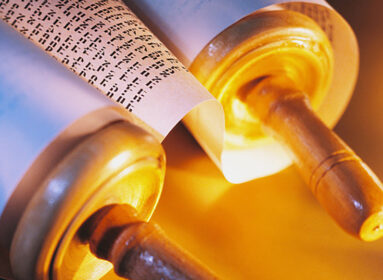There are those who believe that eventually the universal language that will be spoken all over the world will be English. Our literature is so vast and the influence and the scientific and technological advances that have been made in the United Sates will mandate that the English language will be studied and to a great extent utilized the world over.
But truly the worldwide language of communication in our time and I believe in the history of humankind, is the language of music. No matter what foreign language you hear- when a song is sung-whether you attend an opera in which the language that is voiced is Italian or French or Hebrew-one can intimately feel the message and experience- the emotion that is generated by the performance- even though the actual meaning of the words is not understood by you. Whatever country one visits, the language of music is pervasive and the depths of the communication can be understood and appreciated.
Just a few weeks ago we read the portion of “Beshalach” in the Torah. Moses, our teacher, once crossing the sea, sang the beautiful song of “Az Yashir” with the children of Israel. Whether Moses was singing a song or whether he might have been reciting poetry-one could feel the emotion and the depths of this song by just hearing the cantellation in the Synagogue. After he finished his song, his sister Miriam gathered all the women together with their tumbrels to chant and dance and celebrate this great miracle. The music must have been so powerful and inspiring. When the Levites sang in the Holy Temple one could only imagine the sound of their beautiful voices and the passion that was generated by their music. Other “singers of Israel” appear countless times in our Torah and the Prophets. Just to cite a few-the song of “Ha’azinu” by our teacher Moses-The song of Dvorah the prophetess-the song of Chanah and of course the singer of Israel-King David.
Music is a powerful communicator and it is no wonder that when teachers teach our Holy Torah to our children they do so in sing-song fashion-aiding the memory-because music is experienced and is remembered better than simple repetition of language.
I am indebted to all our Jewish composers who have given us such a wealth of beautiful music-music that stirs the heart. Particularly my friend, Shlomo Kharlbach whose mystical songs raise me to such spiritual heights. Though during his lifetime his genius was not appreciated by many of our fellow Jews. Today his songs and melodies are part of the service in all synagogues all over the world no matter whether they are Chasidic, Modern Orthodox, Sephardic, Conservative or Reform. His music has become the universal communicator amongst our people.
Just a few weeks ago another singer and musician died, who also left a wealth of songs and melodies that has also infiltrated all sects of our davening. Though Debbie Friedman is not known to most Orthodox families or Synagogues-her impact on song and music has made a huge impression on the lives and observances of her Conservative and Reform constituency and even today in many Orthodox schools her music is sung in classrooms- during ceremonies such as Havdalah and simple holiday children’s celebrations.
Her music and song should also be celebrated and appreciated–for music is pure– without blemish-uncontaminated- and if composed and sung with a full heart and soul its impact can be felt by everyone in their own special way.
So I write posthumously:
Thank you, Debbie Friedman, for your musical contributions during your short lifetime and for all the beautiful music you left behind for us to enjoy.
May her memory be for a blessing.
Rabbi Mordechai Weiss is the principal of the Bess and Paul Sigel Hebrew Academy of Greater Hartford. All comments are welcome at Ravmordechai @aol.com.








 Southern New England Jewish Ledger
Southern New England Jewish Ledger










